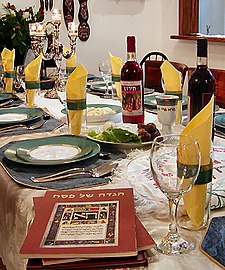Passover
Jewish holiday celebrating the Israelites' liberation from slavery in Egypt
Passover (Hebrew: פסח, Pesach) is a religious holiday or festival noted by ceremonies each year by Jewish people. They celebrate it to remember when God used Moses to free the Israelites from slavery in Egypt, as told in the book of Exodus in the Bible.[4] God told Moses to set aside this special week originally called "the feast of unleavened bread". During this time, the people eat special foods, do special rituals and sing songs. Passover starts on the 15th of Nisan on the Hebrew calendar, which falls in March or April.
| Passover | |
|---|---|
 | |
| Official name | Hebrew: פסח (Pesach) |
| Observed by | Jews and Samaritans |
| Type | Jewish |
| Significance | Celebrates the Exodus, the freedom from slavery of the Children of Israel from ancient Egypt that followed the Ten Plagues. Beginning of the 49 days of Counting of the Omer |
| Begins | 15th day of Nisan[1][2] |
| Ends | 21st day of Nisan in Israel, and among some liberal Diaspora Jews; 22nd day of Nisan outside of Israel among more traditional Diaspora Jews.[3] |
| Celebrations | In Jewish practice, one or two festive Seder meals – first two nights; in the times of the Temple in Jerusalem, the Passover sacrifice. In Samaritan practice, men gather for a religious ceremony on mount Gerizim that includes the ancient lamb sacrifice. |
| Related to | Shavuot ("Festival of Weeks") which follows 49 days from the second night of Passover. |
Second Passover
changeThe "Second Passover" (Pesach Sheni) on the 15th of Iyar in the Hebrew Calendar is mentioned in the Hebrew Bible[5] as a make-up day for people who were unable to offer the Passover sacrifice at the appropriate time.
References
change- ↑ "First day of Passover". timeanddate.com. Retrieved 2013-02-17.
- ↑ "What Is Passover?". Rabbinical College of Australia and N.Z. Archived from the original on 2012-08-05. Retrieved 2013-02-17.
- ↑ "Last day of Passover". timeanddate.com. Retrieved 2013-02-17.
- ↑ Exodus 3–15
- ↑ Numbers 9